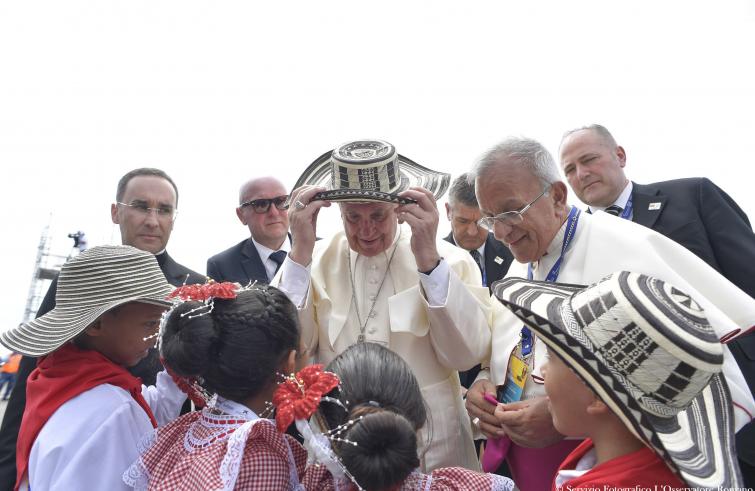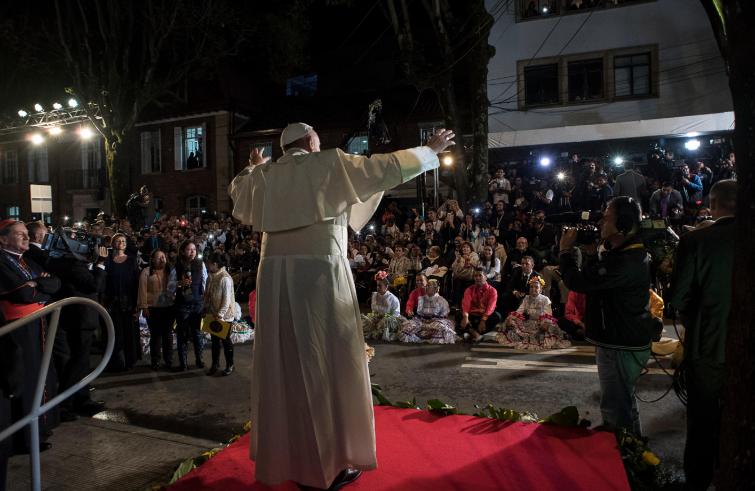Interview
Mons. Elkin Fernando Álvarez Botero, Secretary General of the Colombian Bishops’ Conference (CEC), drew a balance of this historical visit. “Saturday – he said – I had the opportunity to exchange a few words with the Holy Father, everything went well and the Pope was very happy. I spoke about the motto of the visit, ‘Let us take the first step’: there is a widespread feeling that turning a new page, doing new things, is actually possible”

Seen from the Colombian Church – as well as in the eyes of the Colombian population – Francis’ visit has been a masterpiece. The Pope found the right way and the right words to undertake one of the most delicate visits of his pontificate, in a Country that is recovering from 52 years of internal conflicts, but which still strives to find unity and concord on the ways to achieve peace. Most of all, the Holy Father knew exactly how to take “el primer paso” – the official motto of the visit. He was welcomed by millions of people willing to take that first step, or at least to try to. Msgr. Elkin Fernando Álvarez Botero, Secretary General of the Colombian Bishops’ Conference (CEC), whom we asked to draw a preliminary outline of this historical visit, is visibly satisfied. He closely followed the first three-and-a-half days of the Pope’s visit, especially Saturday, in Medellín, the diocese where he serves as Auxiliary Bishop. On Sunday September 10 he remained in his home town, following from a distance the last part of the visit in Cartagena.
“On Saturday – he revealed – I had the opportunity of exchanging a few words with the Holy Father, everything went smoothly, the Pope was very happy. I mentioned the motto of the visit, ‘Let us take the first step’. There is a widespread feeling that it is truly possible to turn the page, to do new things.”
Mons. Álvarez, what are the moments and the words that you will cherish most dearly as a memento of these days? Three in particular. In chronological order they were: Thursday, in Bogota, when the Pope focused on the commitment of the Church and on her wish to be a protagonist at a time when the Country is in need of a radical transformation. President Santos was there. Shortly after he delivered a speech addressed to us bishops, which touched me deeply. He spoke about the spiritual approach and the actions we are called to undertake. The second occasion was in Villavicencio, on Friday, during the ceremony for national reconciliation. We Colombians have a saying, meaning that the Pope was ‘dado en clavo’ (which could be translated as: he put things in the right order at the right time, Ed.’s note). The third special moment was on Saturday in Medellín. The Pope animated Christian vocation, he called for generosity and zeal, in particular he referred to priests, men and women religious.
In this respect he reiterated his request to priests to renounce privileges and go out and meet people, especially those who are suffering … Indeed, the Pope is getting us used to a new vocabulary, and on Saturday he “invented” yet another expression, he asked us to , “callejar” the Gospel, to bring the Gospel in the streets.

Let us return to the key-theme of peace. A major debate sparked off on the eve of the visit in Colombia on whether the Pope, as he had announced, would have made an apostolic visit or if to a certain extent he would have influenced Colombia’s social and political debate. Would it be right to say that it was a false problem? The Pope proclaimed the peace of the Gospel, but this proclamation can only but transform society…
Yes, I agree. The Pope did not deviate from his pastoral purpose. This was in fact an apostolic visitation, but it was absurd to think that he wouldn’t make an appeal to pace. Peace is the Gospel. It’s not a political program. And we shouldn’t forget that this Country needs peace.
In your opinion has this appeal been welcomed by the Colombian people? I am surprised by the choral way in which it happened. Catholics, and citizenry as a whole, understood that the Country needs to undertake this path. Here in Colombia the impact on the media was also strong, even a sports program discussed the appeal to put aside hatred and resentment.
It would be right to say that the Pope has reawakened everyone.

There remains the problem of political polarization, although in the past days the debate was no longer as heated. Ex-President Uribe, who strongly opposes the ongoing peace process, has written to the Pope, lowering the temperature of the debate. Can it be hoped that such polarization will be overcome? Indeed, over the past days there appeared to be a lower degree of polarization. But the Pope is aware that it exists. It could be understood by his words, by the fact that he appealed to leave resentment and divisions behind. This Country needs common goals, notwithstanding the respect for difference of opinion.
The Holy Father appeared to be deeply aware that reconciliation is not a magic wand. It’s an every-day effort. He mentioned how wheat and weeds are sown in the same field. That’s why it’s important to strengthen the good seeds.
The Pope also repeated his appeal to remove inequalities and injustices. Is it another important goal for the future? As Bishops we shall carefully read and study everything the Pope said and we will reiterate his words. In the past days he often addressed the theme of inequality, poverty, corruption, of breakups and violence inside the family. We had the opportunity to carry out a deep reflection on violence, on the educational task that lies ahead.
How can the Colombian people be described during these past days?
They were overflowing, extraordinary, beyond all expectations. As many as 1.2 million faithful attended the Mass in Medellin, and many were lined up along the streets. I saw much joy along with the devotion of the Colombian people.
The Pope has left. Will nothing be the same again? Yes, nothing will be as it was. We expect the visit to usher in new things, carrying out new things in Christ.